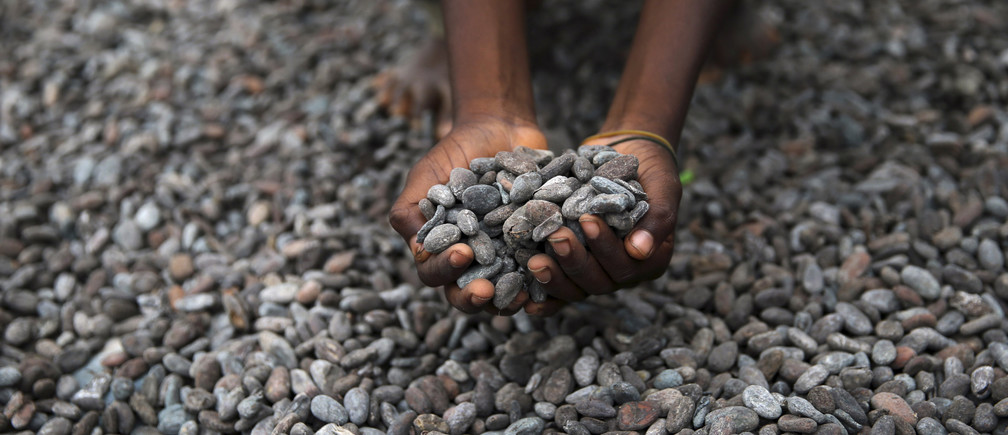
Extreme weather threatens Cameroon’s hopes of becoming a cocoa giant

Cameroon’s plan to more than double cocoa production by 2020, moving the country up the global ranks of producers and improving incomes for its farmers, is under increasing threat from extreme weather, according to the state support company for growers.
Heavy rains have slowed expected output and rattled farmers, with many switching to food crop production to make a more reliable living.
“The rains have been so severe in recent times, coming even when least expected, generating production worries for both farmers and the government,” said Jerome Mvondo, director-general of the Cameroon Cocoa Development Corporation, at an event in Buea, the capital of the country’s Southwest region and its main cocoa-producing zone.
Cameroon is the world’s fifth biggest cocoa grower behind the Ivory Coast, Ghana, Nigeria and Indonesia. According to government statistics, the crop accounts for about half the country’s exports of basic products such as food, timber, fish and minerals.
Cocoa sales contribute about 250 billion CFA francs ($426 million) to state coffers each year.
In 2012, Cameroon’s government announced plans to increase cocoa production from around 225,000 tonnes annually to 600,000 tonnes by 2020.
But that goal is now threatened by erratic and prolonged rains, especially in the Southwest region. In the last 2015-2016 season, production was around 269,000 tonnes, Mvondo said.
Plans to plant an additional 100,000 hectares (247,000 acres) of new cocoa trees each year have fallen short, with the area under cultivation having grown by just 2,500-3,500 hectares since 2014, Mvondo said.
‘THE RAINS COME IN ANY ORDER’
Farmers say they used to worry that rain during the harvest would delay the drying of their cocoa beans, but now rains often take them by surprise at the heart of the dry season, when the cocoa plants flower and produce buds.
“The rains now come in any order, making it difficult for us to plant new crops, spray cocoa pods with pesticides against diseases and dry the cocoa bean naturally. This has really reduced our output and income,” said Ajasco Nzeme, a cocoa farmer from Tombel, in Cameroon’s Southwest region.
“I am almost giving up cocoa farming. I had planned on expanding my cocoa farm by four hectares by 2018, but with the disturbing rains it is not worth the trouble,” said Nzeme, who grows 16 hectares (40 acres) of the crop.
Rains have been coming as early as February rather than at the more common beginning of April, causing buds to fall off the cocoa trees and the pods to blacken.
“The farmers are even refusing free pesticides offered by the government for fear it will be washed away by the rains as soon as it is applied,” Mvondo said.
Besides killing cocoa flowers and young pods, the unusual rain can affect the quality of the crop that is harvested, and force farmers to smoke-dry beans instead of drying them in the open air, farmers said.
Many farmers say they also face increasing difficulty getting their harvest to market on mostly earthen roads.
Andrew Ngomnkalle, a 59-year-old cocoa farmer in Tombel, said his yield had dwindled from 60 bags per acre in 2014 to 35 bags in 2016.
“I have been a cocoa farmer all my life but have never witnessed such confusion in the pattern of rainfall,” he said.
HARVEST LOSSES, LOWER PRICES
Changing weather is also making cocoa more susceptible to pests and disease, said Zachee Nzohngandembou, executive officer of the Centre for the Environment and Rural Transformation, a nongovernmental organization in Limbe that works with local farmers.
Losses from diseases and pests claimed between 30 and 40 percent of Cameroon’s harvest in the 2014-15 season, according to the National Cocoa and Coffee Board, which regulates cocoa and coffee production.
The farmers’ situation has been made worse over the past year by a slump of more than one third in the prices paid for the beans by exporters, following a downward trend in prices on the international market.
According to government data, a kilo of beans fetches about 900-960 FCA francs ($1.50 to $1.65) in production areas, down from 1,600 francs in 2012-13.
In some remote areas, particularly in the Southwest region, prices can be as low as 700 francs.
Many farmers in Cameroon say they are deserting cocoa production for other cash and food crops.
“We have no choice than to concentrate on cash crops like plantains and cocoyam to be able to feed our families,” said Nzeme.
Experts agree that worsening climate variability has become a major bottleneck faced by cocoa producers worldwide.
Global production decreased by 217,000 tonnes in the 2015-2016 season, to just over 4 million tonnes, a decline of 5 percent from the previous season, according to a November 2016 report by the International Cocoa Organization.
In Africa, production is estimated to have fallen over the same period by 124,000 tonnes – almost 4 percent – to 2.9 million tonnes, with the drop attributed mostly to adverse weather conditions and an outbreak of black pod disease.
Nevertheless, the government says it still hopes to boost cocoa production by giving farmers better meteorological information so that they can make more informed decisions on when to plant and harvest.
Henry Eyebe Ayisi, Cameroon’s minister of agriculture, said the government is partnering with non-governmental organisations such as the Global Centre for Compliance, Hazards and Disaster Management to help farmers better understand climate threats.
A new program will send monthly text messages to help growers better plan their farming activities in the face of changing weather conditions, Eyebe said.






